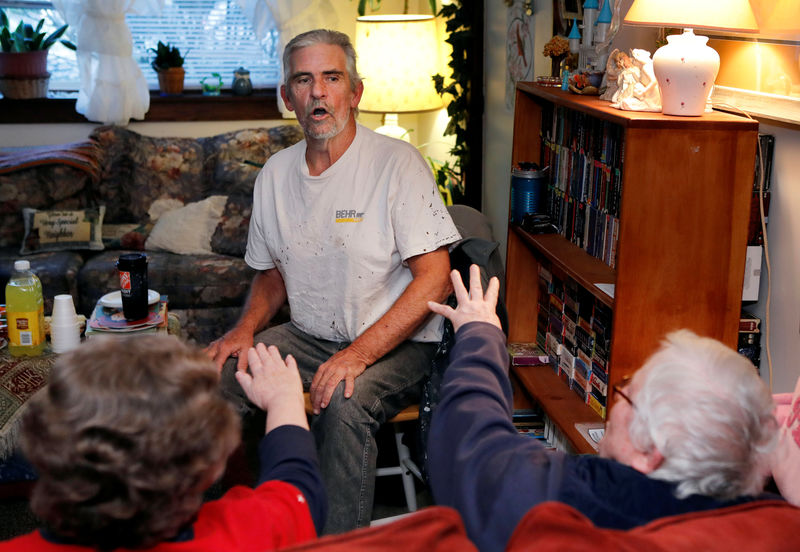


Editors note: Attention to language in paragraph 30 that may be offensive to some readers)
By Jason Szep
ELLSWORTH, Maine (Reuters) – “He lies,” huffed Janet Foster.
“And he’s a dirty old man,” chimed in her sister Jean as they discussed Donald Trump’s flaws a few days before he was elected the new president of the United States.
“Well, I am with him,” their brother Paul, 60, interjected, raising his voice over snacks of cheese, muffins and crackers in the family’s living room. “Hillary Clinton is like a puppet – you know it’s all scripted.”
The 2016 U.S. election was unprecedented in the way it turned Americans against each other, according to dozens of interviews in rural United States and across some of the most politically charged battleground states.
It divided families like the Fosters in rural Ellsworth, Maine, broke up friendships and turned neighbor against neighbor.
In a recent Reuters/Ipsos survey, 15 percent of respondents said they had stopped talking to a family member or close friend as a result of the election. For Democrats, this shoots up to 23 percent, compared to 10 percent for Republicans. And 12 percent had ended a relationship because of it.
There was no comparative polling data from previous elections. But interviews with relationship counselors and voters suggest this election stood out by summoning passions, anger and a divisiveness in ways that will make healing difficult after Clinton’s loss to Trump on Tuesday.
Sarah Guth, a Democrat in Colorado, says her father – an ardent supporter of Trump – no longer speaks with her after they clashed on Facebook (NASDAQ:FB) over their political views.
“He crossed a line,” she said.
After attending a Trump rally, Guth wrote on Facebook that she saw 10 minorities among thousands of people. “I’m increasingly convinced that this election is about race,” she wrote. “I mean a fear among the white majority that their rule is coming to an end.”
Some posters told her “to go to hell,” she recalled in an interview. “And then my dad very publicly attacked me, telling me that I should be ashamed of myself.” The two have not spoken since.
Ty Turner-Bond, a 35-year-old black man in North Carolina, says he lost friends because of his support for Trump. Some called him an “Uncle Tom,” a slur for African Americans accused of deferring to white people; others threatened violence.
“PEOPLE ARE TENSE”
In Springfield, a city on Ohio’s Mad River, Duke Level, 57, voted for Trump because he wanted “a wrecking ball” to hit Washington. The owner of Un Mundo Cafe isn’t surprised this election created divisions, and he fears they could get worse.
“This is one of those crossroads crisis moments in history,” he said.
Hours earlier, Trump rallied about 5,000 supporters a few miles away in a dirt-floored livestock arena. He blasted Clinton as “the most corrupt person ever to seek the office of the presidency,” drawing chants of “lock her up,” as well as a few of “string her up.”
Down the street, Richard Scott, 51, an African-American supporting Clinton, shook his head when told of those chants. Those words, he said, recalled 20th Century lynchings of black Americans – including in Springfield where a black prisoner was shot and hung from a pole on Main Street in 1904.
“It’s terrible,” he said.
Weeks ago, he planted a Clinton sign in his yard. His neighbors put up Trump signs. Outside the funeral home he owns, a pro-Clinton sign was defaced with a “Hillary for Prison” sticker. “People are tense,” said Scott.
The election hardened an already-clear racial divide in the former industrial city of 60,000 people – a snapshot of America at about 75 percent white and 18 percent black. Interviews with residents suggested its northern areas, mostly affluent and white, would vote for Trump, while its mostly black, lower-income southern section would largely support Clinton.
“There is a division in this town, economically and racial. And we saw that in this election,” said Bob Leath, 58, owner of Buckeye PC Repair who voted for Trump to “clean house” in Washington. “If you voted for Clinton, you were most likely either young, lower-income or from the south side of the area.”
For some, the tensions reach the bedroom. Sam Nail, a Cincinnati marriage counselor, said he has two couples who cited the election season as a “stressor” in their relationship.
Much of the anger gets uncorked on social media and will be hard to undo. Some is well publicized. National Review writer David French has written about “an unending torrent of abuse” he and his family faced online from white nationalist Trump supporters, including a Tweeted image of his 7-year-old daughter’s face in a gas chamber.
Others are less well known, like Brenda Thomas’ tangles with her older brother on Facebook. She says her brother unleashed a daily stream of Facebook posts on Clinton and President Barack Obama that she found objectionable. She said when her husband, a Republican, tried to reason with him, he was “unfriended” on Facebook.
“I feel that I have to walk on eggshells with him and it causes problems at family functions,” said Thomas, 63, of Elizabethtown, Kentucky.
In Charlotte, North Carolina, Karen Wilson, describes this election as “stressful” on Facebook. “I’ve got family members who are mad at me for deleting entire Facebook threads when I thought they were becoming too negative. I’ve deleted Facebook friends who I realized I never should have been friends with in the first place,” said Wilson, 43.
Fourteen percent of respondents in the Reuters/Ipsos poll said they had blocked a family member or close friend from social media because of the election. For Democrats, this rises to 23 percent compared to 8 percent for Republicans.
“FREE SPEECH ATTACK”
The divisions tore into the fabric of some communities. In Provo, Utah, Trump supporter Loy Brunson awoke on an October morning to find his car spray-painted with the words “AmeriKKKa” – a reference to “KKK” white supremacists – and “Fuck Trump.” His two Trump yard signs were destroyed.
“So I doubled down, got motivated and put up 85 signs in my yard,” he said. Within days, all but six of those were stolen.
“This was more than vandalism,” he said in an interview. “This was a free speech attack.”
Some blame the divisiveness on campaign rhetoric that inflamed racial, ethnic and class tensions that have long simmered in America. Angry and extremist language moved into the mainstream.
George Lakoff, a linguistics professor at University of California, Berkeley, blames Trump’s use of language, which he ranks as among the most violent of any candidate in modern times. He specifically notes Trump’s suggestion in August that gun rights activists could take matters into their own hands if Clinton defeated him, as well as the New York businessman’s comments that she should go to prison.
“When you have extremes of that order, you have extremes of anger, extremes of fear,” Lakoff said.
In Mississippi, Chad Scott, an activist in the Clay County Republican Party, fears a post-election split between the party’s working-class Trump supporters and business-minded elites – a sentiment echoed in Maine, where Foster, the Ellsworth resident at odds with his sisters, witnessed the election’s political vitriol first hand.
Foster’s van was one of 20 vehicles spray-painted outside a Trump rally on Oct. 15 in the city of Bangor. And across Ellsworth, pro-Trump yard signs were stolen almost as fast as they were planted, Republican officials say.
Foster worries about the divisions ahead.
“My sisters will forgive me for my political views,” he said. “But the country is going to be on fire.”

















Its always hard to swallow the pill.
Hmm lets see what’s gonna happen.
Yes, I feel the same way.